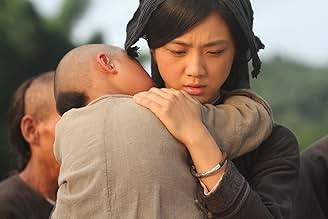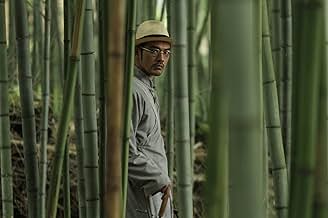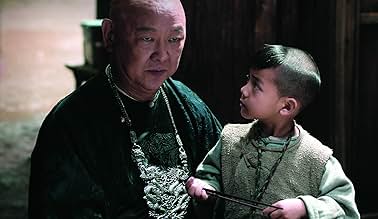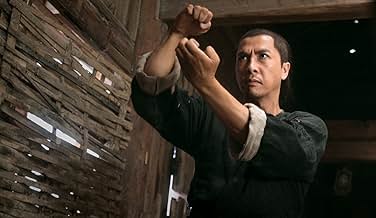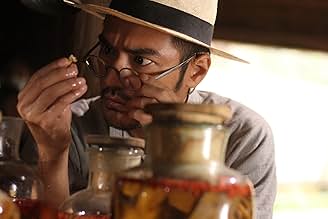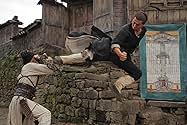VALUTAZIONE IMDb
7,0/10
16.210
LA TUA VALUTAZIONE
Liu Jin-Xi (Donnie Yen) è un artigiano del villaggio la cui vita tranquilla viene sconvolta dall'arrivo di due pericolosi gangster nell'emporio locale.Liu Jin-Xi (Donnie Yen) è un artigiano del villaggio la cui vita tranquilla viene sconvolta dall'arrivo di due pericolosi gangster nell'emporio locale.Liu Jin-Xi (Donnie Yen) è un artigiano del villaggio la cui vita tranquilla viene sconvolta dall'arrivo di due pericolosi gangster nell'emporio locale.
- Premi
- 14 vittorie e 21 candidature totali
Jia-Min Li
- Xiaotian
- (as Jiamin Li)
Zheng-Yuan Zhang
- General store keeper
- (as Zhengyuan Zhang)
Du Ning
- Tavern waiter (Dian Xiaoer)
- (as Ning Du)
Xian-Guo Yin
- General store keeper's wife (Liu Laotaitai)
- (as Xianguo Yin)
Yan-Qi Zhang
- Young thief
- (as Yanqi Zhang)
Qing-Hua Cun
- Young thief's father
- (as Qinghua Cun)
Feng-Chun Xu
- Young thief's mother
- (as Fengchun Xu)
Wang Wei
- No. 1 village elder (Yi Lao)
- (as Wei Wang)
Lian-Sheng Wang
- No. 2 village elder (Er Lao)
- (as Liansheng Wang)
He Shao-Wei
- Village elder (Liu cuncun zhanglao)
- (as Shaowei He)
Recensioni in evidenza
One of the best modern Wu Xia movies with overwhelming combats and spectacular scenes . Being well set during China's Imperial dynasty , and spectacular and colorfully directed by Peter Chan . It deals with a sinful martial arts expert called Liu Jin-xi (Donnie Yen) wants to start a new tranquil life, only to be hunted by a determined Detective called Xu Bai-Jiu (Takeshi Kaneshiro of House of flying daggers) who investigates his dark past and his former master (Wang Yu) . Liu lives almost anonymous until two robbers enter their village to rob a provision store and defends himself and kill them . Later on , the village is attacked and in order to seek vengeance Liu uses his extraordinary martial art skills .
This classic Wu Xia flick displays lots of violence , action filled , thrills and fierce combats . This luxurious martial arts film was marvelously filmed with good production design , colorful cinematography and breathtaking scenes . The flick displays lots of violence, action filled , thrills and fierce combats . This is a colourful, China set and quite budget movie ; leave no cliché untouched , though the fighting are magnificently staged . The picture is full of tumultuous sequences with frenetic action , surprises , fierce combats and groundbreaking struggles . Amid the grandeur of the scenarios and impressive fights is developed an intrigue about a villager who bears dark secrets and stubborn Detective exploring his hidden side using C.S.I methods . The picture is starred by three myths of Wu Xia and Chinese martial arts such as Donni Yen who starred "Seven Swords" , ¨Hero¨ , ¨Yip man¨ saga , Takeshi Kaneshiro who acted in ¨Warlord¨ ¨Chungking Express¨, ¨Red Cliff¨ and Wang Yu who starred classic Kung-fu movies for Shaw Brothers as "The Chinese Boxer" , the 1st real movie non-swords, only bare hand and kicks fighting, a new genre in HK action movies , he gained super stardom status as the "One-armed Swordsman" and ¨ Master of flying guillotine¨ ; Wang paved the way for the future Bruce Lee and Jackie Chan for such a genre.
The motion picture was compellingly directed by the Chinese Peter Ho-Sun Chan who has established himself firmly as a distinguished filmmaker/producer whose last 4 films have generated millions in China box office . In as early as the nineties, Chan already scored a string of critically acclaimed box office hits, including his award-winning directorial debut ¨Between Hello and Goodbye¨ (1991) and following ¨He's a Women, She's a Man¨ (1994) and ¨Comrades, Almost a Love Story¨ (1997), those produced by his own United Filmmakers Organization (UFO), among which Comrades has won a record 9 Hong Kong Film Awards and was named one of the Ten Best Movies of 1997 by Time Magazine. In 1998, Chan directed his first Hollywood picture ¨The Love Letter¨ for Steven Spielberg's Dreamworks SKG and starred by Spielberg's wife : Kate Capshaw. In 2000, he established Applause Pictures dedicated to quality co-productions aimed at audiences across Asia. In 2005, foreseeing the ever-growing market in China and its fast expanding audiences, Chan decided to take on the China market with the musical extravagance Perhaps Love (2005), Shot entirely on location in Mainland China, it became one of the year's top-grossing films in China, Hong Kong and Taiwan, and received a record 29 awards. Chan next directed ¨The Warlords¨ (2007) with Takhesi Kaneshiro and produced Derek Yee's ¨Protégé¨ (2007). The two films were the two highest grossing Hong Kong-China co-productions of 2007. And of course , this successful ¨Wu Xia¨ (2011) . Rating : Above average . The motion picture will appeal to Donnie Yen fans , he's a complete show .
This classic Wu Xia flick displays lots of violence , action filled , thrills and fierce combats . This luxurious martial arts film was marvelously filmed with good production design , colorful cinematography and breathtaking scenes . The flick displays lots of violence, action filled , thrills and fierce combats . This is a colourful, China set and quite budget movie ; leave no cliché untouched , though the fighting are magnificently staged . The picture is full of tumultuous sequences with frenetic action , surprises , fierce combats and groundbreaking struggles . Amid the grandeur of the scenarios and impressive fights is developed an intrigue about a villager who bears dark secrets and stubborn Detective exploring his hidden side using C.S.I methods . The picture is starred by three myths of Wu Xia and Chinese martial arts such as Donni Yen who starred "Seven Swords" , ¨Hero¨ , ¨Yip man¨ saga , Takeshi Kaneshiro who acted in ¨Warlord¨ ¨Chungking Express¨, ¨Red Cliff¨ and Wang Yu who starred classic Kung-fu movies for Shaw Brothers as "The Chinese Boxer" , the 1st real movie non-swords, only bare hand and kicks fighting, a new genre in HK action movies , he gained super stardom status as the "One-armed Swordsman" and ¨ Master of flying guillotine¨ ; Wang paved the way for the future Bruce Lee and Jackie Chan for such a genre.
The motion picture was compellingly directed by the Chinese Peter Ho-Sun Chan who has established himself firmly as a distinguished filmmaker/producer whose last 4 films have generated millions in China box office . In as early as the nineties, Chan already scored a string of critically acclaimed box office hits, including his award-winning directorial debut ¨Between Hello and Goodbye¨ (1991) and following ¨He's a Women, She's a Man¨ (1994) and ¨Comrades, Almost a Love Story¨ (1997), those produced by his own United Filmmakers Organization (UFO), among which Comrades has won a record 9 Hong Kong Film Awards and was named one of the Ten Best Movies of 1997 by Time Magazine. In 1998, Chan directed his first Hollywood picture ¨The Love Letter¨ for Steven Spielberg's Dreamworks SKG and starred by Spielberg's wife : Kate Capshaw. In 2000, he established Applause Pictures dedicated to quality co-productions aimed at audiences across Asia. In 2005, foreseeing the ever-growing market in China and its fast expanding audiences, Chan decided to take on the China market with the musical extravagance Perhaps Love (2005), Shot entirely on location in Mainland China, it became one of the year's top-grossing films in China, Hong Kong and Taiwan, and received a record 29 awards. Chan next directed ¨The Warlords¨ (2007) with Takhesi Kaneshiro and produced Derek Yee's ¨Protégé¨ (2007). The two films were the two highest grossing Hong Kong-China co-productions of 2007. And of course , this successful ¨Wu Xia¨ (2011) . Rating : Above average . The motion picture will appeal to Donnie Yen fans , he's a complete show .
I loved this! Kara Hui, Jimmy Wang Yu and Donnie Yen all give absolutely terrific performances, with Yen's perhaps being the best of his career. Lots of wire assist in the martial arts, but it works in the context of the film, and besides... Hui and Wang aren't exactly spring chickens, so its great to see them in anything, much less doing such fine work in such a fantastic film! Plus, as one or two others have noted, though there are martial arts in this movie, I would not exactly call this a martial arts film. Regardless, it is easily among director Peter Chan's best, Chan - of course - also being responsible for HE'S A WOMAN, SHE'S A MAN / COMRADES: ALMOST A LOVE STORY / the GOING HOME segment from THREE / and Jet Li's THE WARLORDS).
The film also stars Takeshi Kaneshiro. He portrays an investigator who humorously refuses to believe that it was simply accidental, bumbling, good luck that allowed Yen's country bumpkin, Jinxi (intentional wordplay?), to win out in a battle with two notorious murdering thugs. Instead, he believes Jinxi is hiding his martial arts skill (much as TV's Columbo would hide his intelligence), though each time he puts Jinxi to a cruel and painful test, the result is the same... Jinxi proves to be less than he seems, not more. But that's when Kara Hui and Jimmy Wang Yu enter the picture, and they too think that Jinxi is hiding his true identity, and they're willing to murder or maim his loved ones in order to force him to reveal his hand. And speaking of hands, there's a very nice homage to Wang Yu's ONE ARMED BOXER and ONE ARMED SWORDSMAN in the final chapter of this funny and dramatic film.
The film also stars Takeshi Kaneshiro. He portrays an investigator who humorously refuses to believe that it was simply accidental, bumbling, good luck that allowed Yen's country bumpkin, Jinxi (intentional wordplay?), to win out in a battle with two notorious murdering thugs. Instead, he believes Jinxi is hiding his martial arts skill (much as TV's Columbo would hide his intelligence), though each time he puts Jinxi to a cruel and painful test, the result is the same... Jinxi proves to be less than he seems, not more. But that's when Kara Hui and Jimmy Wang Yu enter the picture, and they too think that Jinxi is hiding his true identity, and they're willing to murder or maim his loved ones in order to force him to reveal his hand. And speaking of hands, there's a very nice homage to Wang Yu's ONE ARMED BOXER and ONE ARMED SWORDSMAN in the final chapter of this funny and dramatic film.
DRAGON, a Chinese remake of Cronenberg's A HISTORY OF VIOLENCE with added martial arts action, is a fine-looking film. The period setting is brought vividly to life and the plot moves at a fair old whack, always avoiding cliché in its exploration of a former gangster attempting to lead a decent life as an ordinary family man. Of course, it's a Donnie Yen film, so there are the inevitably lengthy and detailed martial arts sequences which are typically strong and help to lift the movie's entertainment value immeasurably.
Elsewhere, the material does feel a little strained at times and the story seems to fall apart as it progresses. The second half is noticeably inferior to the first, and the film seems to be merely treading water up until the final confrontation between anti-hero and villain. Still, the producers deserve kudos for casting martial arts star and genre icon Jimmy Wang Yu (completely unrecognisable these days, it has to be said) as the chief bad guy.
In addition, there's a serious and finely-tuned performance from Takeshi Kaneshiro as a detective investigating Yen's background. Kaneshiro's character is somewhat incongruous given the provincial nature of the rest of the movie but Kaneshiro can always be relied upon to deliver carefully mannered performances and his role here proves no exception to that rule.
Come the roll of the final credits, I was left feeling mildly entertained by the material, but also slightly dissatisfied, purely because the quality of the action isn't on par with the highs of IP MAN 1 & 2, FLASH POINT and other Yen classics. I've been spoilt by such films, and as a result Dragon felt a little lacklustre, more watchable as an interesting curio than a full-blooded fight flick.
Elsewhere, the material does feel a little strained at times and the story seems to fall apart as it progresses. The second half is noticeably inferior to the first, and the film seems to be merely treading water up until the final confrontation between anti-hero and villain. Still, the producers deserve kudos for casting martial arts star and genre icon Jimmy Wang Yu (completely unrecognisable these days, it has to be said) as the chief bad guy.
In addition, there's a serious and finely-tuned performance from Takeshi Kaneshiro as a detective investigating Yen's background. Kaneshiro's character is somewhat incongruous given the provincial nature of the rest of the movie but Kaneshiro can always be relied upon to deliver carefully mannered performances and his role here proves no exception to that rule.
Come the roll of the final credits, I was left feeling mildly entertained by the material, but also slightly dissatisfied, purely because the quality of the action isn't on par with the highs of IP MAN 1 & 2, FLASH POINT and other Yen classics. I've been spoilt by such films, and as a result Dragon felt a little lacklustre, more watchable as an interesting curio than a full-blooded fight flick.
"A Chinese version of A HISTORY OF VIOLENCE (2005)!", which is my immediate response off the top of my head during the viewing at a local cinema, ordainedly a deja vu even banal narrative does undermine the film itself. Also Wu Xia's ostensible propaganda is so-called "microcosmic Kung Fu", which in my opinion, fabricates a promising prologue, particularly leavens the appeal of the detective segments, Takeshi's character is noteworthy for infusing panache into his persistent waywardness, which sounds more intriguing than the hero- hidden-in-a-remote-village plot, unfortunately the mission is unjustly unfulfilled.
Frankly speaking, the overall quality of the film is above average, as Peter Chen's prestige laurels still waver on a high level. The technical job is amazingly done, the acupuncture specifications, the reconstruction of a minority people's village and some canny inventions such as the alarm clock, the ancient condom and the print apparatus are fun to watch, not to mention the ending, which aroused a burst of laughters in the cinema, I must say it is an unexpected and creative one, otherwise, the finale would be more blushing.
Donnie Yen (from the IP MAN franchise), is unquestionably the leading martial superstar in China at present, whilst Jackie Chan is aging and Jet Li put his priority on his charity career. At an abashed age of 48, being the red-hot Kung Fu star, I pessimistically assume that Donnie's heyday will not be protracted too long. This is Takeshi's the third time starring in Peter Chan's films after THE WARLORDS (2007) and PERHAPS LOVE (2005), this time, his thunder cannot be stolen. I am also surprised to see Tang Wei (the budding starlet in LUST, CAUTION 2007) took such a marginalized role in the film, an almost downplayed innocent wife, although solid, her only shining moment is curbed within one cry-scene, to me, it is an inexcusable misemployment. Other two weathered Kung Fu masters are Kara Hui and Yu Wang, as the main villains, both give admirable but a shade monochrome performances.
All in all, the film is a niche under my expectation, but after so many recent disappointments, to name a few, THE LOST BLADESMAN (2011), FIST OF FURY: THE LEGEND OF CHEN ZHEN (2010) (both under the belt of Donnie Yen), Wu Xia show how desperate we need some new blood to inject into the now overheated Chinese Kung Fu genre, which I do appreciate for its effort.
Frankly speaking, the overall quality of the film is above average, as Peter Chen's prestige laurels still waver on a high level. The technical job is amazingly done, the acupuncture specifications, the reconstruction of a minority people's village and some canny inventions such as the alarm clock, the ancient condom and the print apparatus are fun to watch, not to mention the ending, which aroused a burst of laughters in the cinema, I must say it is an unexpected and creative one, otherwise, the finale would be more blushing.
Donnie Yen (from the IP MAN franchise), is unquestionably the leading martial superstar in China at present, whilst Jackie Chan is aging and Jet Li put his priority on his charity career. At an abashed age of 48, being the red-hot Kung Fu star, I pessimistically assume that Donnie's heyday will not be protracted too long. This is Takeshi's the third time starring in Peter Chan's films after THE WARLORDS (2007) and PERHAPS LOVE (2005), this time, his thunder cannot be stolen. I am also surprised to see Tang Wei (the budding starlet in LUST, CAUTION 2007) took such a marginalized role in the film, an almost downplayed innocent wife, although solid, her only shining moment is curbed within one cry-scene, to me, it is an inexcusable misemployment. Other two weathered Kung Fu masters are Kara Hui and Yu Wang, as the main villains, both give admirable but a shade monochrome performances.
All in all, the film is a niche under my expectation, but after so many recent disappointments, to name a few, THE LOST BLADESMAN (2011), FIST OF FURY: THE LEGEND OF CHEN ZHEN (2010) (both under the belt of Donnie Yen), Wu Xia show how desperate we need some new blood to inject into the now overheated Chinese Kung Fu genre, which I do appreciate for its effort.
What's strongest in this film isn't the martial arts action sequence, or the much talked about Sichuan accent that versatile actor Takeshi Kaneshiro adopts in his role as a detective seeking to unearth the truth behind a peasant paper maker Liu Jun Xi played by Donnie Yen. Rather it's the art house sensibilities that director Peter Ho-Sun Chan fuses in the film that makes it a cut above the average martial arts movie, pretty much focused on characters, motivations, and plenty of drama about family and karma hidden behind an investigative narrative providing a more scientific approach to fantasy.
The opening shot establishes Peter Chan's intent to want to be different, with little nuances put into roles, and a painstakingly beautiful set design and art direction to introduce us to Liu and his family, with wife Ayu (Tang Wei) and two children, living quiet, almost anonymous lives until two robbers enter their village to rob a provision store, and Liu finding it hard not to lend a hand to a fellow villager in need. It's the classic top pugilist whose retirement plans of tranquility getting cut short no thanks to circumstances that spell trouble where trouble got attracted to them like bees to flowers, and for that innate chivalrous spirit to be unleashed, with expected consequences. Yes some quarters equate this to History of Violence, and to a certain extent, it undeniably does possess parallels.
Elevated to a folk hero in the village where praises get sung in his name, the detective Xu Bai Jiu (Kaneshiro) enters the scene for an autopsy and to examine the crime scene, only for his suspicion to be piqued that Liu may be more than meets the eye, perhaps even one of three most notorious wanted men he had been pursuing. Here's where the story shows off its flash of brilliance, with flawed characters providing added depth to characterization and story, keeping your interest level up as we discover how Xu's a little schizophrenic in his investigative approach, constantly communicating with his alter ego and we get to see some CG animated body internals sort of like the way Guy Ritchie treated his Sherlock Holmes, with dalliances to the question of is Liu or isn't Liu the powerful pugilist as Xu's investigations have made him out to be.
Takeshi Kaneshiro continues in similar vein with his Zhuge Liang character in having to form an uneasy camaraderie with his skilled counterpart, where in Red Cliff was with Tony Leung's Zhou Yu, here it's with Donnie Yen's Liu as investigations gets underway to try and coax something out of the latter. Yen has ample time producing some rarely seen acting chops thanks to a role that requires duality, and also showing he's no pushover when it comes to fighting in front of the camera, and taking on the directing responsibility to choreograph the action as well. And to balance the testosterone level of the movie, Tang Wei takes on the role of a demure wife who also bore some dark secrets from her past, but unfortunately this aspect remained largely vague and not as well explored, as is Kaneshiro's detective when he goes back to seek assistance from his estranged wife (Li Xiao Ran) in a one scene wonder/wander.
In a tale of two jarring halves suddenly remembering that it needed some cornerstone token villains, in come the legendary kung fu stars such as Wang Yu (the one armed swordsman being paid an obvious homage in this film), and Kara Hui who has seen a renewed lease in her career after an award winning turn on Ho Yuhang's film At the End of Daybreak. Both return to their martial arts roots which were hallmarks of their heydays, and it's really a pity how as villains they don't get much of a respect they deserve having to come back to the silver screen (especially for Wang Yu), portraying mean looking, ass kicking caricatures to give our heroes a run for their money.
Both were severely underutilized, but there is little doubt about their screen charisma when they finally appear to further the plot. Kara Hui was there solely for some of the set action pieces like a rooftop chase (not again), and between the two, it's of course Wang Yu who got the better deal portraying a Bane like brute, and I thought his heft with age provided plenty of gravitas and weight as the gangster chief who's not to be trifled with, providing the film a much needed climax and proceeding at breakneck speed toward the finale fight which pitted science against fantasy, in some ways how modern day mechanics trounced martial arts, though you get the idea employed here, the execution left much to be desired, since all it could elicit wasn't a sense of brilliance, but unintended comedy involving the much dreaded Deus Ex Machina, yet in some ways keeping in line with the notion of karmic retribution, albeit very literally.
Perhaps it was the weight of expectations that a movie titled Wu Xia would provide something more from an action front, and some may have gone to the extent to call this a redefinition of the martial arts genre through scientific methods and explanation. I thought that would really be stretching it, with big battles few and far between, the spotlight clearly centered on its story and characterization instead.
The opening shot establishes Peter Chan's intent to want to be different, with little nuances put into roles, and a painstakingly beautiful set design and art direction to introduce us to Liu and his family, with wife Ayu (Tang Wei) and two children, living quiet, almost anonymous lives until two robbers enter their village to rob a provision store, and Liu finding it hard not to lend a hand to a fellow villager in need. It's the classic top pugilist whose retirement plans of tranquility getting cut short no thanks to circumstances that spell trouble where trouble got attracted to them like bees to flowers, and for that innate chivalrous spirit to be unleashed, with expected consequences. Yes some quarters equate this to History of Violence, and to a certain extent, it undeniably does possess parallels.
Elevated to a folk hero in the village where praises get sung in his name, the detective Xu Bai Jiu (Kaneshiro) enters the scene for an autopsy and to examine the crime scene, only for his suspicion to be piqued that Liu may be more than meets the eye, perhaps even one of three most notorious wanted men he had been pursuing. Here's where the story shows off its flash of brilliance, with flawed characters providing added depth to characterization and story, keeping your interest level up as we discover how Xu's a little schizophrenic in his investigative approach, constantly communicating with his alter ego and we get to see some CG animated body internals sort of like the way Guy Ritchie treated his Sherlock Holmes, with dalliances to the question of is Liu or isn't Liu the powerful pugilist as Xu's investigations have made him out to be.
Takeshi Kaneshiro continues in similar vein with his Zhuge Liang character in having to form an uneasy camaraderie with his skilled counterpart, where in Red Cliff was with Tony Leung's Zhou Yu, here it's with Donnie Yen's Liu as investigations gets underway to try and coax something out of the latter. Yen has ample time producing some rarely seen acting chops thanks to a role that requires duality, and also showing he's no pushover when it comes to fighting in front of the camera, and taking on the directing responsibility to choreograph the action as well. And to balance the testosterone level of the movie, Tang Wei takes on the role of a demure wife who also bore some dark secrets from her past, but unfortunately this aspect remained largely vague and not as well explored, as is Kaneshiro's detective when he goes back to seek assistance from his estranged wife (Li Xiao Ran) in a one scene wonder/wander.
In a tale of two jarring halves suddenly remembering that it needed some cornerstone token villains, in come the legendary kung fu stars such as Wang Yu (the one armed swordsman being paid an obvious homage in this film), and Kara Hui who has seen a renewed lease in her career after an award winning turn on Ho Yuhang's film At the End of Daybreak. Both return to their martial arts roots which were hallmarks of their heydays, and it's really a pity how as villains they don't get much of a respect they deserve having to come back to the silver screen (especially for Wang Yu), portraying mean looking, ass kicking caricatures to give our heroes a run for their money.
Both were severely underutilized, but there is little doubt about their screen charisma when they finally appear to further the plot. Kara Hui was there solely for some of the set action pieces like a rooftop chase (not again), and between the two, it's of course Wang Yu who got the better deal portraying a Bane like brute, and I thought his heft with age provided plenty of gravitas and weight as the gangster chief who's not to be trifled with, providing the film a much needed climax and proceeding at breakneck speed toward the finale fight which pitted science against fantasy, in some ways how modern day mechanics trounced martial arts, though you get the idea employed here, the execution left much to be desired, since all it could elicit wasn't a sense of brilliance, but unintended comedy involving the much dreaded Deus Ex Machina, yet in some ways keeping in line with the notion of karmic retribution, albeit very literally.
Perhaps it was the weight of expectations that a movie titled Wu Xia would provide something more from an action front, and some may have gone to the extent to call this a redefinition of the martial arts genre through scientific methods and explanation. I thought that would really be stretching it, with big battles few and far between, the spotlight clearly centered on its story and characterization instead.
Lo sapevi?
- QuizDonnie Yen and Peter Chan presided over the lighting of a billboard for Dragon (2011) that broke the Guinness Book of World Records for its size, 3591 square metres, previously held by a poster for a Michael Jackson album
- Citazioni
Xu's investigator: [referring to Liu Jin-Xi] He's a reformed man.
Detective Xu Bai-Jiu: We're not here to reform criminals.
Xu's investigator: Then what's our purpose?
Detective Xu Bai-Jiu: [sternly] To serve the law!
Xu's investigator: If the law doesn't help reform people, what good is it?
- Versioni alternativeThe scene where the bodies of two bandits are being examined has been shortened to eliminate a very brief spanking of a mischievous child who had been poking the corpses with a stick.
- ConnessioniReferences Io... e il ciclone (1928)
I più visti
Accedi per valutare e creare un elenco di titoli salvati per ottenere consigli personalizzati
Dettagli
Botteghino
- Lordo Stati Uniti e Canada
- 11.137 USD
- Fine settimana di apertura Stati Uniti e Canada
- 11.137 USD
- 2 dic 2012
- Lordo in tutto il mondo
- 29.282.887 USD
- Tempo di esecuzione
- 1h 55min(115 min)
- Colore
- Mix di suoni
- Proporzioni
- 2.35 : 1
Contribuisci a questa pagina
Suggerisci una modifica o aggiungi i contenuti mancanti







